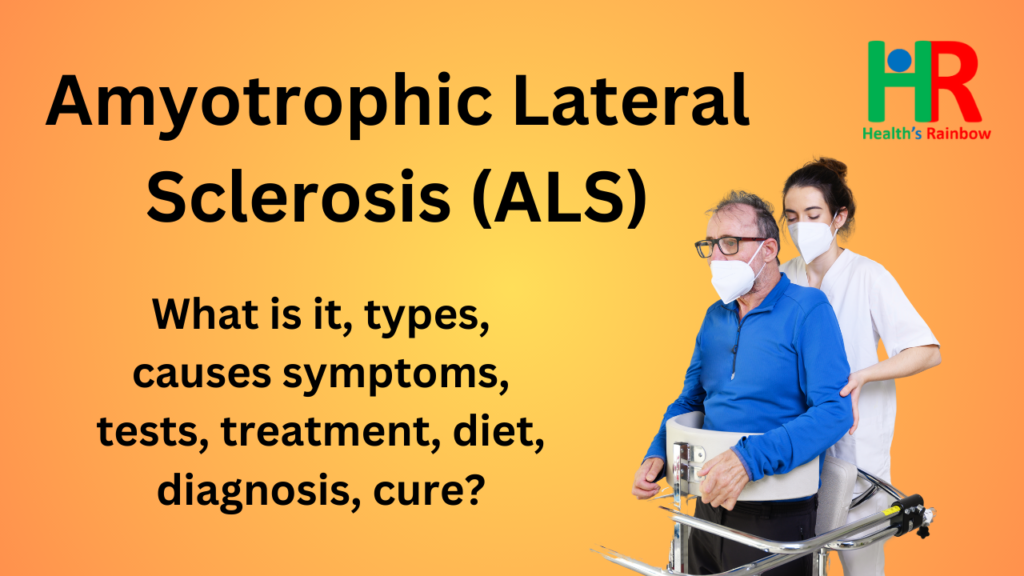
What is Amyotrophic Lateral Sclerosis (ALS)?
Amyotrophic lateral sclerosis (ALS), also known as Lou Gehrig’s disease, is a progressive neurodegenerative disease that affects nerve cells in the brain and spinal cord, causing muscle weakness, paralysis, and eventually, respiratory failure.
ALS is a progressive, fatal neurodegenerative disease characterized by the degeneration of motor neurons (nerve cells that control muscle movement) in the brain and spinal cord. This loss of motor neurons leads to muscle atrophy (wasting), weakness, and paralysis.
Types of Amyotrophic Lateral Sclerosis (ALS)?
• Sporadic ALS: The most common form, accounting for about 90% of cases. The cause is unknown.
• Familial ALS: Accounts for about 10% of cases and is caused by inherited genetic mutations.
Symptoms of Amyotrophic Lateral Sclerosis (ALS)?
ALS symptoms vary but typically include:
• Muscle weakness: Often starts in one limb or area of the body.
• Muscle twitching (fasciculations):
• Muscle cramps and stiffness:
• Slurred speech (dysarthria):
• Difficulty swallowing (dysphagia):
• Progressive paralysis: Eventually affecting all muscles, including those involved in breathing.
Causes of Amyotrophic Lateral Sclerosis (ALS)?
The exact cause of sporadic ALS is unknown. Familial ALS is caused by specific gene mutations. Research suggests a combination of factors may be involved, including:
• Genetics:
• Environmental factors:
• Protein misfolding:
• Oxidative stress:
• Glutamate excitotoxicity:
Who Can Suffer from Amyotrophic Lateral Sclerosis (ALS)?
ALS can affect adults of any age, but it is most commonly diagnosed between the ages of 40 and 70. Men are slightly more likely to develop ALS than women.
Diagnostic Tests of Amyotrophic Lateral Sclerosis (ALS)?
Diagnosing ALS involves a comprehensive evaluation:
• Medical history and neurological exam:
• Electromyography (EMG): Measures electrical activity in muscles.
• Nerve conduction studies: Measure the speed of nerve impulse transmission.
• MRI of the brain and spinal cord: To rule out other conditions.
• Blood and urine tests:
• Genetic testing: For familial ALS.
• Pulmonary function tests: To assess breathing function.
Stages of Amyotrophic Lateral Sclerosis (ALS)?
ALS progression varies, but generally involves:
• Early stage: Muscle weakness and other symptoms are mild.
• Progressive stage: Symptoms worsen, affecting more muscles.
• Late stage: Significant muscle weakness and paralysis, including respiratory muscles.
Treatment of Amyotrophic Lateral Sclerosis (ALS)?
There is no cure for ALS, but treatments are available to manage symptoms and improve quality of life:
• Medications: Riluzole and edaravone are FDA-approved medications that may slow the progression of ALS.
• Multidisciplinary care: Involves a team of healthcare professionals, including physicians, nurses, physical therapists, occupational therapists, speech therapists, and respiratory therapists.
• Symptom management: Medications and therapies to manage specific symptoms, such as muscle cramps, pain, and difficulty swallowing.
• Respiratory support: Including non-invasive ventilation (e.g., BiPAP) and mechanical ventilation.
• Nutritional support: Including feeding tubes if needed.
Best Diet for Amyotrophic Lateral Sclerosis (ALS) (and Prevention)?
There is no specific diet to prevent or cure ALS. A healthy, balanced diet is important for overall health. Maintaining adequate nutrition can be challenging as ALS progresses, so working with a dietitian is often recommended.
Prevention of Amyotrophic Lateral Sclerosis (ALS)?
For sporadic ALS, there is no known way to prevent it. For familial ALS, genetic counseling may be helpful for individuals with a family history of the disease.
Overall Survival Rate of Amyotrophic Lateral Sclerosis (ALS)?
The prognosis for ALS varies. The average survival time after diagnosis is about 2 to 5 years, but some people live much longer. Respiratory failure is the most common cause of death.
Which Doctor Treats Amyotrophic Lateral Sclerosis (ALS)?
• Neurologist: Specialist in brain and nervous system disorders.
Diseases Associated with Amyotrophic Lateral Sclerosis (ALS)?
• Frontotemporal dementia: Can occur in some people with ALS.
For more information Visit us :
Website: http://www.healthsrainbow.com/
Website Blog: https://www.healthsrainbow.com/blog/
Subscriber: https://www.youtube.com/@healthsrainbow4897
Facebook Page: https://www.facebook.com/profile.php?id=100087738795787
Facebook Main Page: https://www.facebook.com/profile.php?id=100072657459686
Instagram: https://www.instagram.com/healthsrainbow/
Twitter: https://twitter.com/healths_rainbow
RELATED VIDEO :
- Urine culture and sensitivity test : https://youtu.be/bGT0uoWumus
- Microalbumin Urine test : https://youtu.be/T0wDz7rKFwc
- Chyle test : https://youtu.be/px-J1QeN6Ds
RELATED ARTICLE :
- Urine Test : https://www.healthsrainbow.com/blog/2022/04/20/
- FNAC TEST : https://www.healthsrainbow.com/blog/2022/02/02/
- TLC TEST : https://www.healthsrainbow.com/blog/2022/01/21/
VISIT OUR WEBSITE
This video Covers the information about:
What is Amyotrophic Lateral Sclerosis (ALS)? Types of Amyotrophic Lateral Sclerosis (ALS)? Symptoms of Amyotrophic Lateral Sclerosis (ALS)? Causes of Amyotrophic Lateral Sclerosis (ALS)? Who Can Suffer from Amyotrophic Lateral Sclerosis (ALS)? Diagnostic Tests of Amyotrophic Lateral Sclerosis (ALS)? Stages of Amyotrophic Lateral Sclerosis (ALS)? Treatment of Amyotrophic Lateral Sclerosis (ALS)? Best Diet for Amyotrophic Lateral Sclerosis (ALS) (and Prevention)? Prevention of Amyotrophic Lateral Sclerosis (ALS)? Which Doctor Treats Amyotrophic Lateral Sclerosis (ALS)?
PUBLISHED BY HEALTHS RAINBOW
